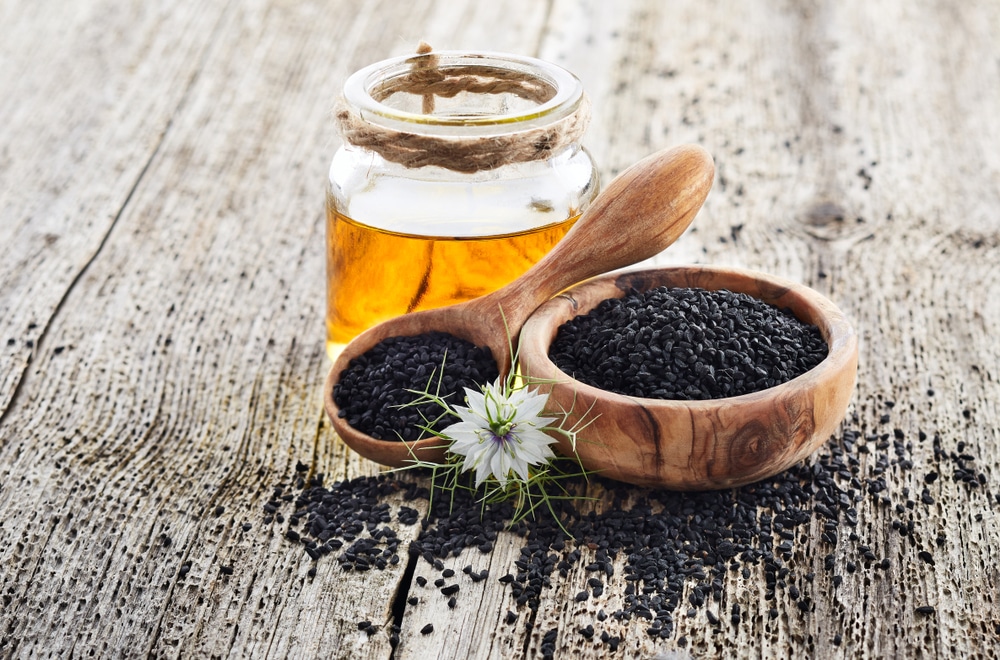Kalonji, Nigella Sativa, or black seed is an annual flowering plant in the family Ranunculaceae. The plant grows to 20 to 30 cm (8 to 12 in) tall and produces flowers that are white, pale blue, or pale purple. The fruit is a large and inflated capsule composed of 3 to 7 united follicles, each containing numerous seeds. Kalonji is native to southeast Europe and southwest Asia. It has a long history of use in traditional medicine as a natural remedy for a variety of ailments. Black cumin seeds contain a compound called thymoquinone, which is responsible for many of the potential health benefits associated with the herb. Studies have shown that black cumin has properties that may be useful in treating or preventing various health conditions, including asthma, allergies, cancer, and diabetes (6). In this article, we will take a look at the potential health benefits of black cumin and the available scientific evidence.
Get your personalized
meal plan!
Black Cumin May Help Treat Asthma
Asthma is a chronic condition characterized by inflammation of the airways. This can lead to wheezing, shortness of breath, chest tightness, and coughing (6).
Asthma symptoms are often triggered by environmental factors such as dust, pollen, and smoke.
There is some evidence to suggest that black cumin may help treat asthma. It contains a compound called thymoquinone, which has anti-inflammatory and immunomodulatory effects (6).
Most studies on the anti-inflammatory effects of black cumin have been done in animals. While these studies are promising, more research on humans is needed before any conclusions can be made.
Black Cumin May Help Treat Allergies
Allergies are caused by an overreaction of the immune system to ordinarily harmless substances, such as pollen or dust. Allergies can cause symptoms such as sneezing, itching, and watery eyes (5).
Black cumin may help treat allergies by reducing inflammation and modulating the immune system. Thymoquinone, the compound in black seed responsible for these effects, has been shown to inhibit histamine release from mast cells (5).
Mast cells are a type of white blood cell that is involved in the immune response. When they are triggered, they release histamine, which causes allergic symptoms (5).
Despite promising results, more research is needed to understand the full extent of black cumin’s effects on allergies.
Read More: Red Lentils Facts, Calories, Health Benefits And Side Effects
Black Cumin May Help Prevent Cancer
Cancer is a group of diseases characterized by the abnormal growth of cells. It is one of the leading causes of death worldwide (2).
There is some evidence that black cumin may help prevent cancer due to its high antioxidant and anti-inflammatory content (5).
Antioxidants work to scavenge and destroy cancer-causing agents known as free radicals. Free radicals are unstable molecules that can damage cells, sometimes leading to the development of cancer (5).
Test tube studies have shown that thymoquinone, the compound in black seed responsible for these effects, can inhibit the growth of various types of cancer cells, including breast, lung, colon, and prostate cancer cells (6). However, human studies are needed to confirm these findings.
Black Cumin May Lower Cholesterol
Cholesterol is a fatty substance that is essential for the structure and function of cell membranes. However, too much cholesterol in the blood is a risk factor for heart disease (6).
Black cumin may help lower blood cholesterol levels by reducing inflammation and oxidative stress. These effects are due, in part, to the presence of thymoquinone (6).
A few studies have found that supplementing with black cumin oil significantly reduced total and LDL (bad) cholesterol levels (6).
Another study found that black cumin oil reduced levels of total and LDL cholesterol as well as triglycerides (a type of fat found in the blood) in people with diabetes (6).
Black Cumin May Help Treat Diabetes
Diabetes is a chronic condition characterized by high levels of sugar in the blood. It can lead to serious health complications if left untreated.
Black cumin may help manage diabetes by reducing inflammation and improving insulin sensitivity. When insulin sensitivity is improved, the body is able to better use insulin, which helps regulate blood sugar levels (6).
A study of people with type 2 diabetes found that black cumin seed extract significantly decreased fasting blood sugar levels and improved insulin sensitivity (6).
Another study showed that black cumin oil was effective in reducing fasting blood sugar levels, as well as reversing insulin resistance in people with type 2 diabetes (6).
Lean and toned up body isn’t just a far-fetched fantasy. Check out the BetterMe app and watch it propel your weight loss journey into high gear!
Black Cumin May Have Antibacterial And Antifungal Properties
Black cumin may have antibacterial and antifungal properties due to the presence of thymoquinone. This compound has been shown to inhibit the growth of various types of bacteria, including Staphylococcus aureus, Escherichia coli, and Pseudomonas aeruginosa (5).
Thymoquinone has also been shown to inhibit the growth of Candida albicans, a type of fungus that can cause infections in people with weakened immune systems (5).
Black Cumin May Boost Brain Health
Brain health may be improved by black cumin due to its antioxidant and anti-inflammatory effects. These effects may help protect the brain from damage and improve cognitive function (5).
Improved memory and cognitive function in people with Alzheimer’s disease is a well-studied benefit of antioxidant-rich foods (5).
Black Cumin May Prevent Stomach Ulcers
Stomach ulcers are open sores that develop on the lining of the stomach. They are a common condition affecting up to 20% of the world’s population (4).
The gastric mucosal barrier is a layer of cells that protects the stomach from damage. This barrier can be weakened by inflammation, which can lead to the development of stomach ulcers (5).
Black cumin may help prevent stomach ulcers by reducing inflammation and strengthening the gastric mucosal barrier (5). One of the most common causes of stomach ulcers is the bacteria H. Pylori, which means that the antimicrobial activity of black cumin may also be helpful.
A study in rats found that black cumin seed extract was effective in healing stomach ulcers and reducing inflammation. Another study found that black cumin oil was effective in preventing the development of stomach ulcers and protecting the stomach lining against the effects of alcohol (6).
However, the current research is limited to animal studies. More research is needed to determine the effects of black cumin on stomach ulcers in humans.
Black Cumin May Help Protect The Liver
The liver is a vital organ that plays an important role in detoxifying the body. Liver damage can be caused by a variety of factors, including inflammation and oxidative stress (8).
Black cumin may help protect the liver against damage by reducing inflammation and oxidative stress (8).
A study in rats found that black cumin seed extract was effective in protecting the liver and kidney in rats injected with a toxic chemical. More studies are needed to determine the effects of black cumin on liver health in humans (8).
Read More: Calcium-Rich Foods For Pregnancy: Benefits And Examples
Black Cumin May Help Reduce Symptoms Of Arthritis
Arthritis is a common condition characterized by inflammation, pain, and stiffness in the joints. It can be caused by a variety of factors, including autoimmune disease, infection, and injury (6).
Black cumin may help reduce the symptoms of arthritis by reducing inflammation. The antioxidants present in black cumin may also help protect the joints from damage (6).
Black Cumin May Help With Weight Management
Weight management is a complex issue that involves many factors, including diet, exercise, and genetics. However, some research suggests that black cumin may help with weight loss by reducing appetite and promoting the burning of fat cells (6).
A 2021 study on rats fed a high-fat diet found that black cumin seed extract was effective in reducing body weight, as well as the size of fat cells. The study also found that black cumin seed extract improved insulin sensitivity and reduced inflammation (7).
Black Cumin May Help With Skin Conditions
Skin conditions such as eczema, acne, and psoriasis are often characterized by inflammation. Black cumin may help to reduce the symptoms of these conditions by reducing inflammation (6).
There is a lack of specific research on the effects of black cumin on skin conditions, but a study in rats found that black cumin seed extract was effective in reducing general inflammation.
Black Cumin Side Effects
Despite having many health benefits, black cumin may also cause some side effects:
Contact Dermatitis
Contact dermatitis is a type of skin inflammation that can occur after contact with an irritant. The symptoms include redness, itching, and swelling (1).
Thymoquinone, the active compound in black cumin, can cause contact dermatitis in some people. Always do a patch test before applying anything to your skin. If you experience any symptoms of contact dermatitis after using black cumin, discontinue use and see your doctor (1).
Pregnancy And Breast-Feeding
Black cumin is not recommended for pregnant or breastfeeding women due to a lack of safety data. If you are pregnant or breastfeeding, it is best to avoid black cumin.
Interactions
Black cumin may interact with certain medications, such as blood thinners and diabetes medications (3). If you are taking any medications, it is best to talk to your doctor before using black cumin.
Looking for a way to break the vicious cycle of weight loss and tone up all the jiggly parts? Watch the extra pounds fly off and your muscles firm up with the BetterMe app!
How Much Black Seed Should I Take Daily?
There is no recommended dosage of black cumin. It is best to start with a small dose and increase gradually as needed.
If you are using black cumin for its medicinal properties, it is best to talk to your doctor before starting.
The Bottom Line
Black cumin is an herbal remedy that has a long history of use in traditional medicine. It has a wide range of potential health benefits, including reducing inflammation, protecting the liver, and improving cognitive function.
Black cumin may also help reduce the symptoms of arthritis and stomach ulcers. However, the research on most of these potential benefits is limited, and it may cause some side effects in some people. If you experience any adverse effects, discontinue use and see your doctor.
DISCLAIMER:
This article is intended for general informational purposes only and does not serve to address individual circumstances. It is not a substitute for professional advice or help and should not be relied on for making any kind of decision-making. Any action taken as a direct or indirect result of the information in this article is entirely at your own risk and is your sole responsibility.
BetterMe, its content staff, and its medical advisors accept no responsibility for inaccuracies, errors, misstatements, inconsistencies, or omissions and specifically disclaim any liability, loss or risk, personal, professional or otherwise, which may be incurred as a consequence, directly or indirectly, of the use and/or application of any content.
You should always seek the advice of your physician or other qualified health provider with any questions you may have regarding a medical condition or your specific situation. Never disregard professional medical advice or delay seeking it because of BetterMe content. If you suspect or think you may have a medical emergency, call your doctor.
SOURCES:
- Association Between Severe Acute Contact Dermatitis Due to Nigella sativa Oil and Epidermal Apoptosis (2018, jamanetwork.com)
- Cancer (2022, who.int)
- Effect of black seed on dextromethorphan O- and N- demethylation in human liver microsomes and healthy human subjects (2010, nih.gov)
- Epidemiology of perforated peptic ulcer: Age- and gender-adjusted analysis of incidence and mortality (2013, nih.gov)
- Nigella sativa L. (Black Cumin): A Promising Natural Remedy for Wide Range of Illnesses (2019, nih.gov)
- Review on Clinical Trials of Black Seed (Nigella sativa) and Its Active Constituent, Thymoquinone (2017, nih.gov)
- The effect of dietary supplementation with Nigella sativa (black seeds) mediates immunological function in male Wistar rats (2021, nature.com)
- The protective effect of Nigella sativa against liver injury: a review (2014, nih.gov)













